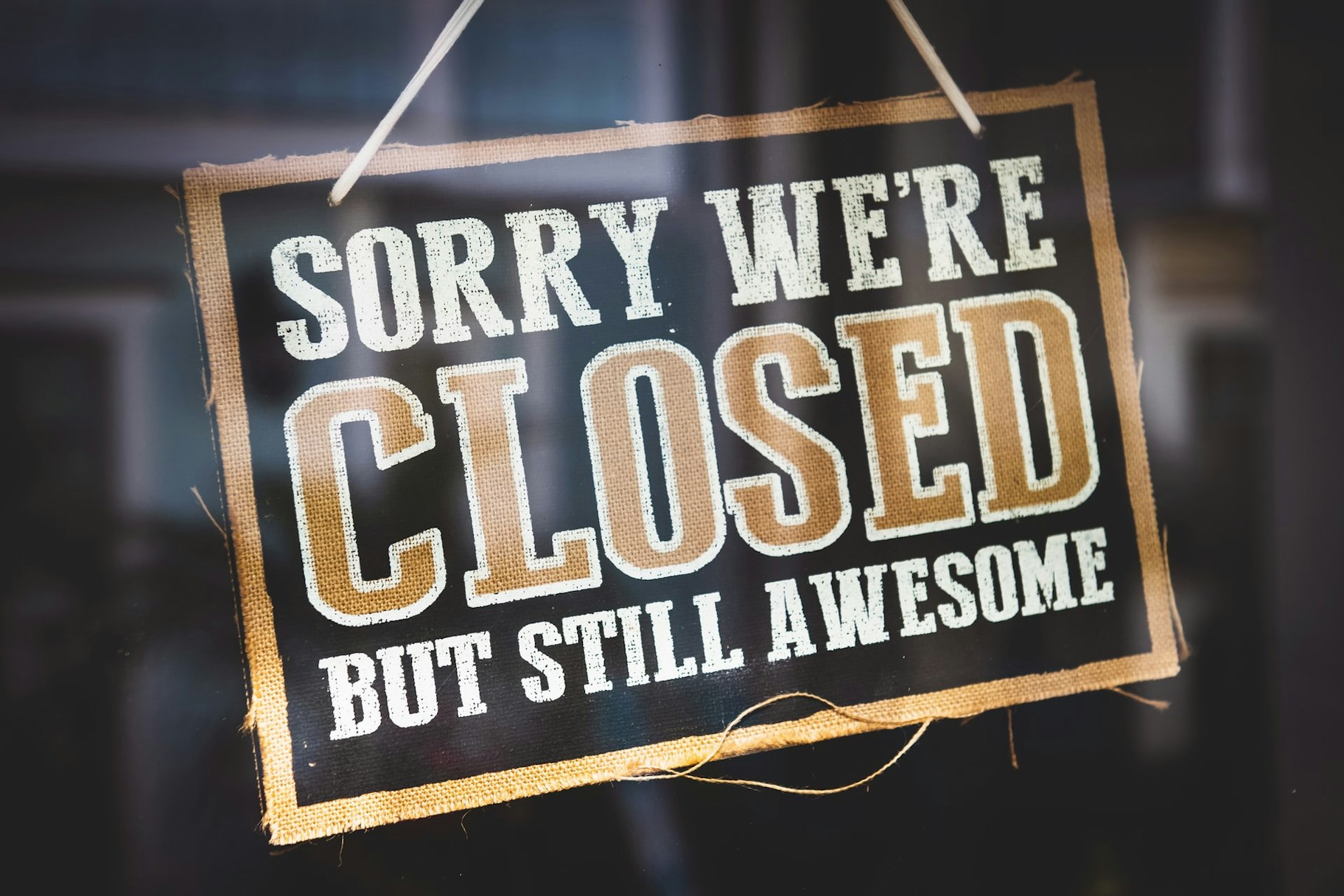Why help small businesses?
Already, more than 100,000 small businesses have closed forever. Now, a whopping 7.5 million small businesses are at risk of closing permanently, and 24 percent are just two months away – or less – from closing for good.
In short, the economic recession driven by COVID-19 is devastating to the small business sector.
“We are going to see a level of bankruptcy activity that nobody in business has seen in their lifetime,” said James Hammond, chief executive of New Generation Research. “This will hit everyone, but it will be harder for small businesses since they don’t have a lot of spare cash.”
In other words, large businesses have war chests of cash to see themselves through the downturn, but small businesses are vulnerable.
This is nothing short of tragic.
The 30.7 million small businesses in the U.S. generate about 50 percent of the country’s GDP. These businesses create 1.5 million jobs annually, spark innovation, and provide opportunities for many people to achieve financial independence.
The U.S. stimulus package intended to help, but the funds ran dry as the program failed to reach those hit the hardest.
Bottom line, if we don’t come together to help small businesses, many will close for good.
Do you have a favorite local cafe or restaurant? Is there a bar, theatre, or club where you and your friends love to hang out? When you support a small business, you’re increasing the chance it will still be there when things return to normal.
If you’re wondering how to support small businesses, here are nine easy ways:
1. Avoid Refunds – Ask for Store Credit or Reschedule Events Instead
If a business can’t deliver a product you ordered, ask for store credit instead of a refund.
This is a great way to show compassion and support small businesses.
Especially as 44.9 percent of small businesses reported disruptions in the supply chain due to COVID-19 measures – in the retail sector, this number jumps to 65.8 percent.
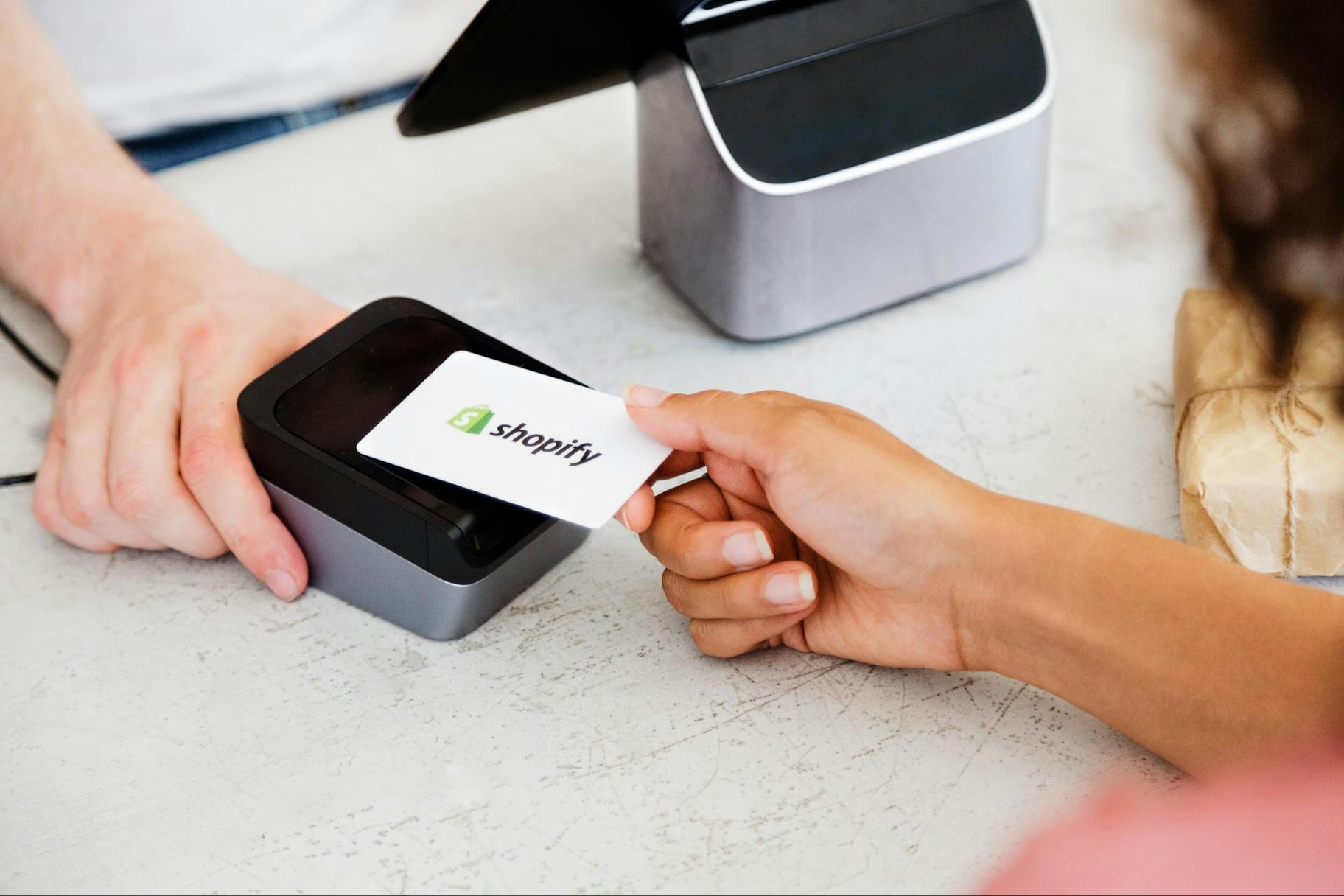
What’s more, if you’ve booked an event, wedding, or trip, try to postpone or reschedule your plans, instead of asking for a refund.
Events planner Melissa Andre said, “Wedding vendors are having dozens if not hundreds of events canceled, putting most of them in a very difficult position. Some vendors will not make it through this time.”
“Changing the date of that booked holiday could be the kindest thing to do right now,” wrote Juliet Kinsman, a travel writer for Condé Nast Traveler. “Rather than seeking a refund, simply postponing plans might be a greater help than you could imagine.”

In short, try not to take money back from small businesses when they need it most. Instead, find a way to receive the product or service you originally wanted at a later date.
2. Purchase Gift Cards in Advance
If you think about it, gift cards are essentially mini-loans. You give a small business some money, and they pay it back in the future with a product or service.
This is a powerful way to help small businesses through the lockdown.
Think of businesses that you buy from often – perhaps your favorite cafe, restaurant, or store – and consider giving them an advance on what you’ll spend with them when things return to normal.
It’s a win-win situation.
Your favorite local business will be able to make ends meet in the meantime, and you’ll have something to look forward to.
Sophie Madison’s Boston store Olives & Grace had to close due to COVID-19. Although the business is still operating through its online Shopify store, gift cards have been a tremendous help.

Just before Madison shut her physical store, one customer came in looking worried and said she’d like to buy a gift card. Madison recounts the story:
“I said, okay, how much would you like that for? And she just paused for a minute. And she said a thousand dollars… You know, it didn’t feel like the warm, fuzzy, thousand-dollar in-store purchase. It felt like, you know, here’s a hug. Let’s hunker down. Here’s some seed money. It was a real love and support gesture.”
If a local small business you love isn’t selling gift cards, let them know about services that can help, such as Shopify, Giftfly, or Yiftee.
All Shopify plans now support gift cards – here’s a step-by-step guide that businesses can use to get set up.
3. Order Takeout – A Lot!
Although you might have time to cook, consider your favorite restaurants who are falling on hard times.
According to the U.S. Bureau of Labor Statistics, the leisure and hospitality sector has been hit the hardest by the measures to contain COVID-19.
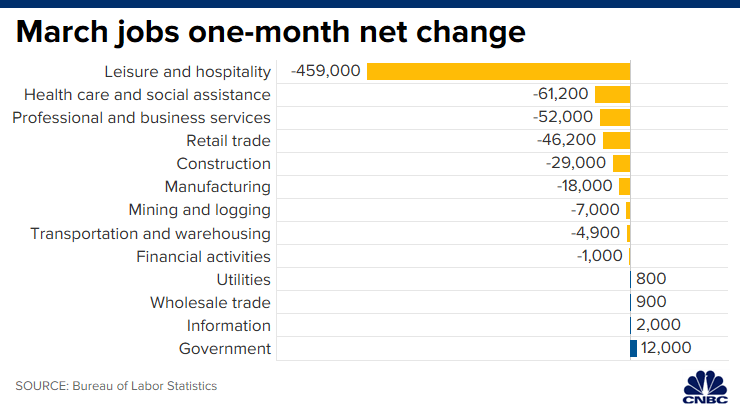
This sector includes restaurants, cafes, delis, and bars – all of which could offer home delivery.
Find your favorite places on social media or check their websites to see if they offer takeout. You could also order through an app like Grubhub or UberEats.
Remember, many places that didn’t offer takeout before the lockdown might have started so they can make ends meet.
American Bar in New York is up and running with takeout delivery.
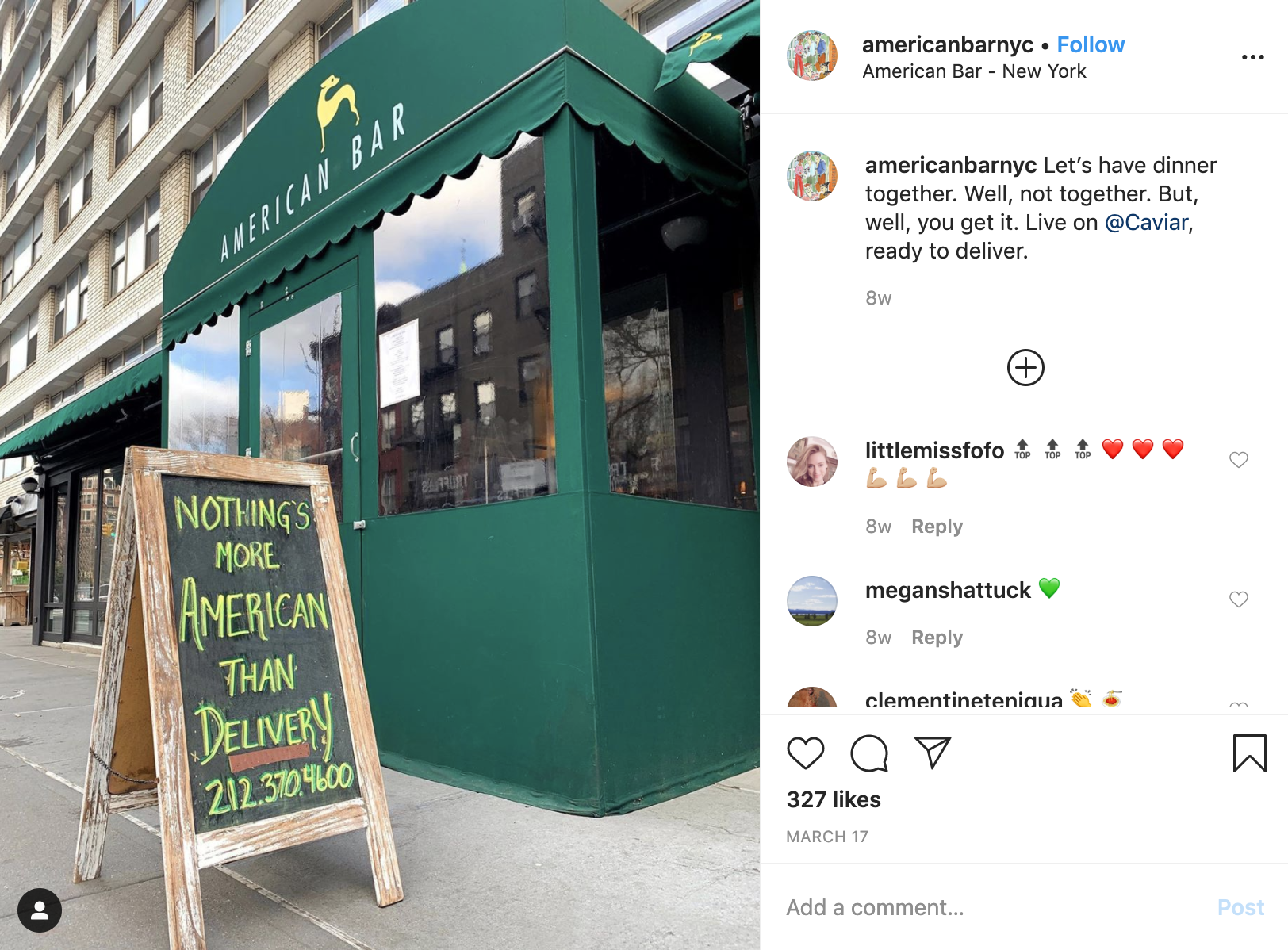
This restaurant has even started selling merchandise through it’s Shopify store to keep the business alive during the lockdown.

Also, provided that you wash your hands thoroughly before and after eating, there is no added cause for concern over COVID-19 contamination.
If your favorite restaurant isn’t offering online takeout orders, maybe they don’t know how to. In this case, send them a link to our guide on how to move your restaurant online.
4. Buy from Small Businesses, Not Corporations
You’re an investor.
Every time you buy something, you’re investing in the future of the business you purchased from – so spend your money wisely!
Before you automatically buy from big-name stores like Target, IKEA, or Amazon, try to find a small business that could provide what you want.
Is there a local bookshop, boutique, or hardware store you could purchase from instead?
Remember, although local businesses often conduct the majority of their business in-store, many have websites that take online orders.
For example, Wrightwood Furniture in Chicago is still operating through its online Shopify store.
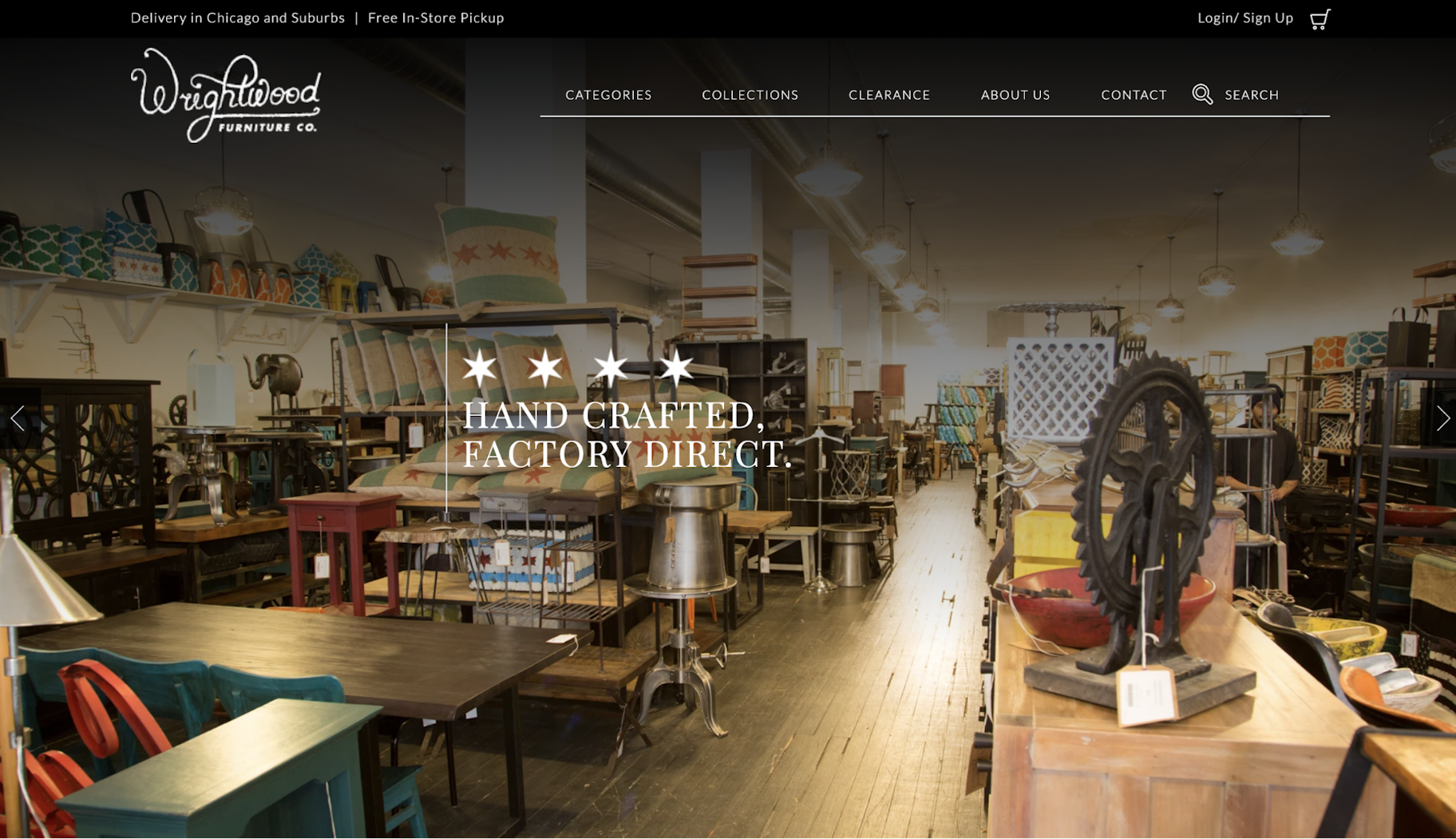
Also, look to local stores for things you often need, like soap and vegetables.
Perhaps there’s a local artisan who makes handmade soap or a farmer’s market delivering boxes of fresh vegetables!
5. Leave a Positive Review
Reviews are a form of social proof and can strengthen a business’s credibility, build trust with new customers, and strongly influence people’s purchase decisions.
The result? More sales for the business.
In short, leaving a review is a great way to support small businesses for free – especially as many small businesses are so deserving of the help.
Take Inflight Surf Shop in Seal Beach, California.
The store had to close its doors due to COVID-19. However, the business is still operating (and selling gift cards!) through it’s online Shopify website.

It’s obvious that Inflight’s customers appreciate the level of service and quality provided by this small business. However, the store has received only 9 reviews on Google in the past 12 months.

If you have more time on your hands while you’re stuck at home, help small businesses by leaving positive reviews on Facebook, Yelp, TripAdvisor, or Google Review.
Plus, you’ll also put a smile on the faces of everyone who works there!
6. Shout Out Small Businesses on Social Media
People are spending 20% more time in apps during the COVID-19 lockdowns.
So instead of scrolling down your feed, why not take a moment to help small businesses with a shoutout?
You don’t need to be an Instagram influencer either. Simply telling your friends and family about a fantastic small business can help.
In fact, 85 percent of small business owners say word-of-mouth referrals are the best way to acquire local customers.
Plus, it’s easier than ever to shoutout businesses on social media thanks to Instagram and Facebook’s new tools, such as the food delivery and gift card stickers.
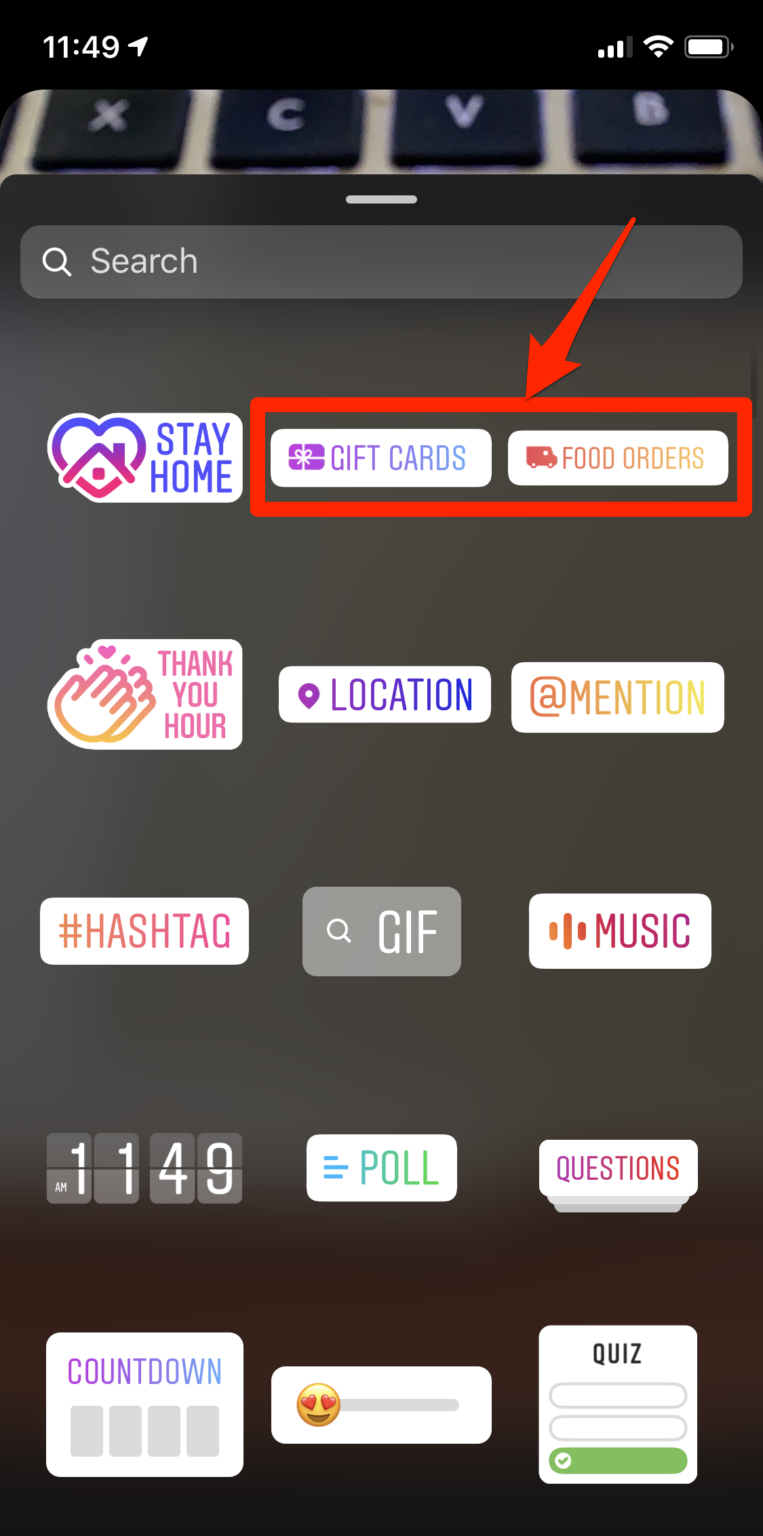
Instagram has also added a new “Support small business” sticker which you can use to show your love for small businesses in Instagram Stories.
There’s also a new section on Facebook called Businesses Nearby, which allows you to see the latest posts from businesses in your area. You can use this tool to find posts from small businesses to engage with and share.
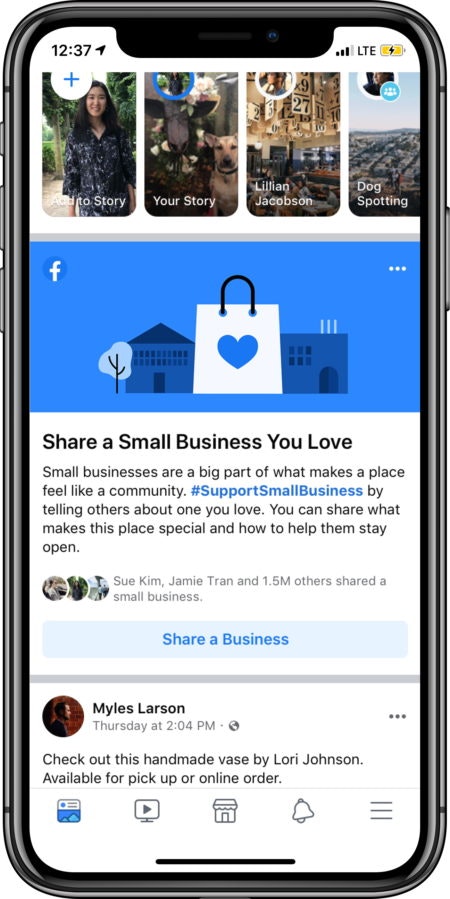
7. Encourage Everyone You Know to Support Small Businesses
If you’re still wondering how to support small businesses without buying, one of the best ways is to encourage everyone you know to help.
You can do this through social media or word-of-mouth.
What’s more, if you happen to run a business yourself, you could even encourage your employees to support other small businesses.
Entrepreneur and investor Mark Cuban set up an employee rewards fund to reimburse employees when they purchase lunch or coffee from local, independent businesses.
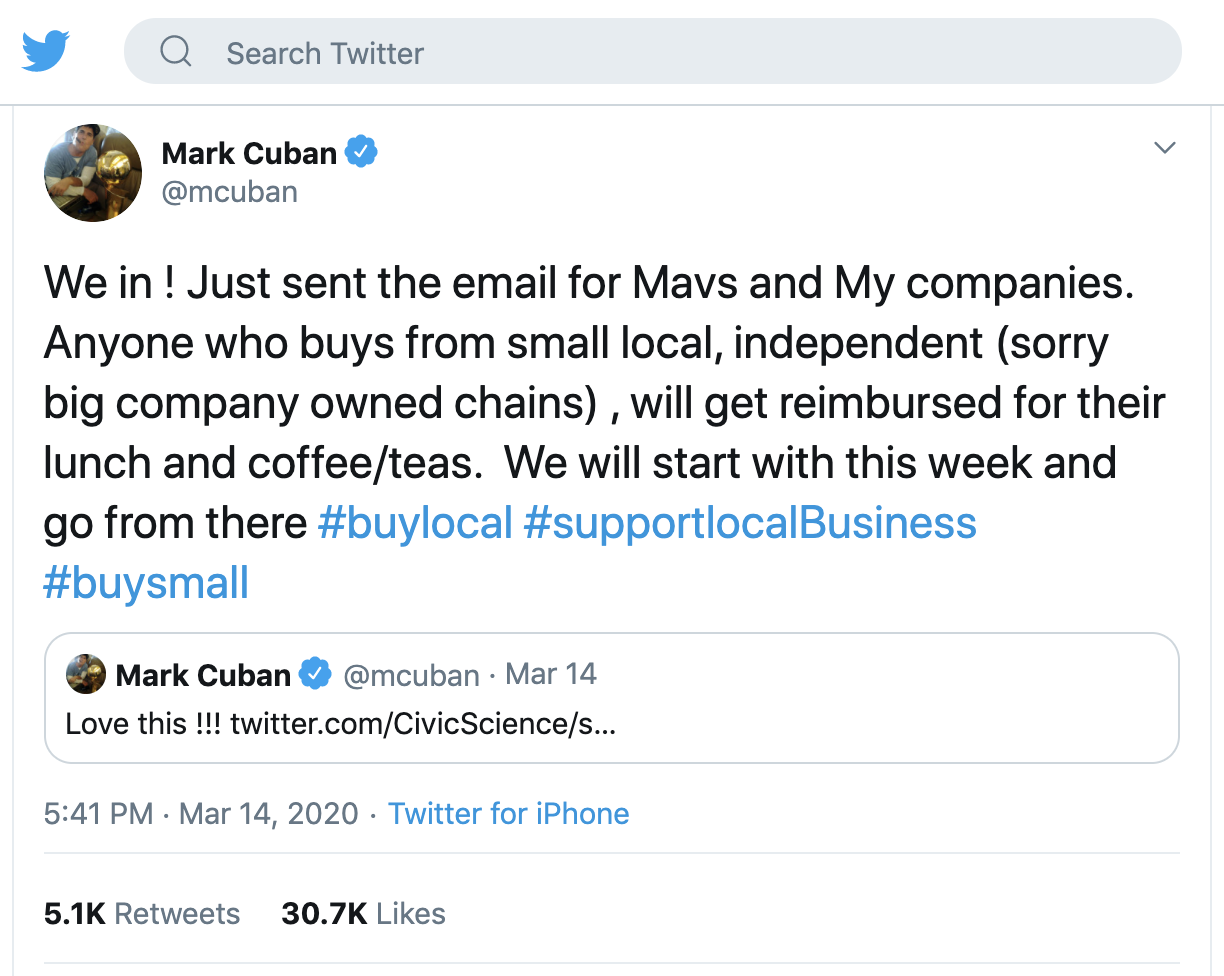
Whenever you show support for local businesses and encourage others to do the same, the effect can snowball as the message is shared.
8. Volunteer to Help a Small Business
This is one of the best ways to support small businesses that aren’t able to operate right now.
Many companies are using the lockdown to work on aspects of their business that they usually don’t have time to work on.
Whether it’s creating a new website, re-decorating a store, or learning how to run Facebook ads, there’s plenty of opportunities to help small businesses effectively use the downtime.
What skills or experience can you offer?
Can you design new menus or help small businesses improve their internet marketing? Perhaps you could simply help the owners repaint their store!
If you work in finance or business, consider offering local businesses free consultations to help them with their finances or business processes.
This can help small businesses to hit the ground running when things return to normal.
To start, reach out to local businesses and ask how you can help. You could also find ways to support small businesses through volunteer services, such as Start Small Think Big, SCORE, or VolunteerMatch.

9. Research Funding Options
There are many schemes designed to help small businesses through this challenging period.
However, the stipulations associated with these schemes can be overwhelming and confusing.
Many small businesses are trying to find ways to pivot their business to keep the lights on, and simply don’t have time to explore their options.
If you’ve got some time on your hands, perhaps you could help.
Consider trying to make sense of the options available for a local business and then send them any resources that seem like a good fit.
Similarly, if you have any experience in applying for business loans, you could help a small business owner with their application.



Summary: How to Help Small Businesses Impacted by COVID-19
When you support a small business, you’re increasing its chances of survival – and preserving livelihoods, communities, and the economy.
In summary, here are nine ways to support your local small businesses:
- Avoid refunds and ask for store credit or to reschedule events.
- Purchase gift cards in advance to enjoy when businesses reopen.
- Order takeout and tip drivers generously.
- Buy from small businesses instead of large corporations whenever possible.
- Leave positive reviews using sites like Facebook, Yelp, TripAdvisor, or Google Review.
- Engage and promote small businesses on social media.
- Encourage friends, family, and employees to help support small businesses.
- Volunteer your time, services, and expertise.
- Research funding options and send relevant opportunities to small businesses.
Lastly, if you know somebody who owns a small business, check in on them regularly and make sure they’re okay. This is a scary and challenging time for small businesses. Any support, whether it’s practical, financial, or emotional, can help.
Have we missed some great ways to support small businesses? Let us know in the comments below!



Want to Learn More?
Read more tips on how to survive and thrive during the COVID-19 crisis:
